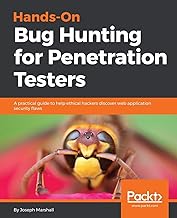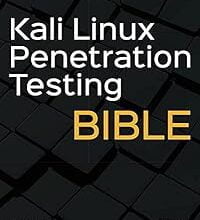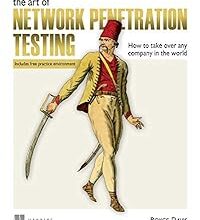Launching Your Cybersecurity Career: Review of The Pentester Blueprint
Starting a Career as an Ethical Hacker

Hey BugBusters! Ready to kickstart your career in ethical hacking? Let’s dive into The Pentester Blueprint by Phillip L. Wylie and Kim Crawley, a must-read for anyone aspiring to become a penetration tester. Whether you’re just starting out or looking to advance in the cybersecurity field, this guide has you covered.
Wylie and Crawley lay out a clear, actionable roadmap for breaking into the world of ethical hacking. They cover everything from essential skills and certifications to practical advice and career tips, making it a valuable resource for millennials and tech-savvy individuals. The book’s engaging style and practical insights ensure that you’re not just reading theory, but also gaining real-world knowledge that you can apply to your cybersecurity journey.
So, if you’re passionate about making a difference in the digital world and ready to enhance your skills, “The Pentester Blueprint” is your go-to guide. Let’s explore why this book is essential for anyone serious about a career in ethical hacking!
About the Authors
Phillip L. Wylie and Kim Crawley bring a wealth of experience and expertise to the cybersecurity field, making them exceptional guides for anyone starting a career in ethical hacking.
Phillip L. Wylie is a seasoned cybersecurity professional with extensive experience in penetration testing and network security. He is known for his practical approach to security and has been actively involved in various cybersecurity projects and consulting roles. Wylie’s deep understanding of the technical and strategic aspects of ethical hacking is reflected in his contributions to the field, including his hands-on training sessions and workshops.
Kim Crawley is a well-respected cybersecurity expert and author with a focus on ethical hacking, network security, and cybersecurity education. With a background in both practical security roles and academic instruction, Crawley offers a balanced perspective on the complexities of cybersecurity. She has authored several influential books and articles on the subject and is an active contributor to cybersecurity communities and forums.
Together, Wylie and Crawley bring a rich blend of practical experience and educational insight to “The Pentester Blueprint.” Their combined expertise not only provides readers with a solid foundation in ethical hacking but also offers valuable tips and strategies for navigating a career in cybersecurity. Their work in educating and mentoring aspiring cybersecurity professionals underscores their commitment to advancing the field and supporting the next generation of ethical hackers.
Overview of the Book
The Pentester BluePrint: Starting a Career as an Ethical Hacker by Phillip L. Wylie and Kim Crawley is a comprehensive guide designed to help beginners navigate their way into ethical hacking. The book is meticulously structured to cover everything an aspiring penetration tester needs to know, from foundational skills to advanced certifications and practical career advice.
Central Themes and Structure: The book begins by laying out the essential skills required for ethical hacking. This includes understanding networking fundamentals, learning programming languages such as Python, and mastering various penetration testing tools. The authors provide clear explanations and step-by-step instructions to help readers build a solid technical foundation.
As readers progress, the book delves into the importance of certifications in the cybersecurity field. Wylie and Crawley cover a range of certifications that can enhance a penetration tester’s credentials, including CompTIA Security+, Certified Ethical Hacker (CEH), and Offensive Security Certified Professional (OSCP). The guide offers detailed information on each certification, including what to expect from the exams and how to prepare effectively.
One of the standout features of The Pentester Blueprint is its focus on practical advice and real-world applications. The authors share their experiences and insights, providing readers with valuable tips on approaching job searches, networking with professionals in the field, and continuing learning and growing throughout their careers. This practical approach ensures that readers not only gain theoretical knowledge but also learn how to apply it in real-life scenarios.
Throughout the book, Wylie and Crawley balance technical detail and actionable career tips. They emphasize the importance of continuous learning and staying updated with the latest cybersecurity trends and technologies. Combining in-depth technical guidance with practical advice, The Pentester Blueprint equips readers with the tools and knowledge they need to succeed in the competitive field of ethical hacking.
In summary, The Pentester Blueprint is an invaluable resource for anyone looking to start or advance their career in ethical hacking. It provides a clear, structured path to acquiring the necessary skills and certifications, along with practical advice on navigating the cybersecurity job market and building a successful career.
Key Highlights
The Pentester Blueprint by Phillip L. Wylie and Kim Crawley is filled with valuable insights and practical guidance. Here are some key highlights that stand out:
Foundational Skills: One of the book’s most crucial sections is dedicated to building foundational skills. Wylie and Crawley emphasize the importance of understanding networking concepts, operating systems, and programming languages. This section particularly benefits beginners, providing a clear roadmap for acquiring the essential knowledge needed to become a proficient penetration tester. The authors recommend specific resources and study methods, making it easy for readers to start building their skill set.
Certification Paths: The chapters on certification paths are incredibly detailed and informative. Wylie and Crawley break down the various certifications that can boost a cybersecurity career, such as CompTIA Security+, Certified Ethical Hacker (CEH), and Offensive Security Certified Professional (OSCP). They offer insights into the content and difficulty of each certification exam, along with study tips and strategies for success. This guidance helps readers choose the right certifications for their career goals and prepares them for the challenges of obtaining these credentials.
Career Tips and Networking: The book’s standout feature is its practical career advice. Wylie and Crawley share their personal experiences and provide actionable tips on how to break into the cybersecurity industry. They cover everything from crafting an effective resume to acing job interviews. Additionally, they highlight the importance of networking and offer strategies for connecting with industry professionals through events, online communities, and social media. This section is particularly valuable for millennials and tech-savvy individuals looking to establish themselves in the field.
Real-World Applications and Examples: The book has real-world examples and practical applications. Wylie and Crawley use case studies and scenarios to illustrate key concepts, making the material more relatable and engaging. For instance, they provide examples of actual penetration testing projects, detailing the steps from initial reconnaissance to final reporting. These examples help readers understand how to apply theoretical knowledge in practical situations, enhancing their learning experience.
Unique Insights and Innovative Techniques: Throughout the book, Wylie and Crawley share unique insights and innovative techniques that set this guide apart. They discuss emerging trends in cybersecurity and offer predictions of ethical hacking. Their forward-thinking approach ensures that readers are prepared for the current landscape and equipped to adapt to future developments.
Emphasis on Continuous Learning: Another key highlight is continuous learning. The authors stress the importance of staying updated with cybersecurity trends, tools, and techniques. They recommend various resources, including books, online courses, and conferences, to help readers continue their education and stay ahead in the ever-evolving field of cybersecurity.
By focusing on these critical highlights, “The Pentester Blueprint” ensures that readers gain a comprehensive understanding of penetration testing and career development in cybersecurity. The blend of foundational knowledge, practical advice, real-world examples, and forward-looking insights makes this book an invaluable resource for anyone serious about pursuing a career in ethical hacking.
Why It’s Recommended for Aspiring Cybersecurity Professionals
The Pentester Blueprint by Phillip L. Wylie and Kim Crawley is a highly recommended resource for aspiring cybersecurity professionals for several reasons:
Utility for Novices: This book serves as an excellent introduction to ethical hacking for those new to cybersecurity. Wylie and Crawley break down complex concepts into digestible sections, making them accessible to beginners. The book covers the essential skills required for penetration testing, such as networking fundamentals, programming languages, and key tools. This foundational knowledge is crucial for building a strong base in cybersecurity.
Advancing in Cybersecurity: Even for those with some experience in cybersecurity, “The Pentester Blueprint” offers valuable insights and advanced strategies to further their careers. The detailed discussion on certification paths helps readers identify and pursue the right credentials, which are vital for career advancement. The book’s practical advice on networking, job hunting, and continuous learning also benefits professionals looking to stay ahead in the competitive cybersecurity landscape.
Practical Strategies for Career Development: The book’s standout feature is its focus on career development. Wylie and Crawley provide actionable tips for breaking into the cybersecurity industry, crafting an effective resume, and excelling in job interviews. They also emphasize the importance of networking and offer strategies for connecting with industry professionals. These practical strategies are invaluable for anyone looking to establish and grow their career in cybersecurity.
Hands-On Knowledge and Practical Tools: The Pentester Blueprint is not just about theory; it’s packed with hands-on knowledge and practical tools. The authors include real-world examples and case studies that illustrate key concepts and show readers how to apply their knowledge in practical situations. This approach ensures that readers gain a theoretical understanding and practical skills they can use in their work.
Ethical Considerations: Another essential aspect of the book is its emphasis on ethical hacking. Wylie and Crawley discuss the ethical considerations and responsibilities of being a penetration tester. They provide guidelines for conducting tests legally and ethically, ensuring readers understand the importance of maintaining professional integrity. This focus on ethics is crucial for developing a responsible approach to cybersecurity.
In summary, “The Pentester Blueprint” is a valuable resource for aspiring cybersecurity professionals at all levels. It provides a solid foundation in ethical hacking, practical strategies for career development, and hands-on knowledge that can be immediately applied. By addressing both the technical and professional aspects of a cybersecurity career, the book equips readers with the tools and insights needed to succeed in the dynamic field of ethical hacking.
Engagement and Learning Path
The Pentester Blueprint is an excellent starting point, but the journey to mastering cybersecurity doesn’t end there. To further your learning and practical application of the concepts introduced by Phillip L. Wylie and Kim Crawley, consider the following suggestions:
Join Online Communities: Engage with online forums and communities dedicated to cybersecurity and ethical hacking. Platforms like Reddit’s r/netsec, Stack Exchange’s Information Security community, and specialized forums like BugBustersUnited offer valuable opportunities to discuss concepts from the book, ask questions, and share experiences. These communities provide diverse perspectives and real-world insights that can deepen your understanding and keep you updated on the latest trends.
Participate in Workshops and Webinars: Look for workshops, webinars, and training sessions focused on penetration testing and cybersecurity. Events hosted by organizations like SANS Institute, Offensive Security, and local cybersecurity meetups offer hands-on labs and interactive sessions that complement the material covered in the book. Participating in these events allows you to practice techniques in a guided setting and learn from industry experts and peers.
Set Up Controlled Lab Environments: Practice the techniques outlined in the book by setting up your lab environment. Use platforms like Hack The Box, TryHackMe, or your virtual lab to create a controlled setting to experiment with penetration testing tools and strategies safely. This hands-on practice is crucial for internalizing the knowledge and developing the skills needed to become proficient in ethical hacking.
Engage in Continuous Learning: Cybersecurity is a rapidly evolving field with constant advancements and emerging threats. To stay current, continuously seek out new information and training opportunities. Read industry news, subscribe to cybersecurity blogs, and follow research papers to keep up-to-date. Books like “The Pentester Blueprint” should be part of a broader learning journey that includes a variety of resources and learning methods.
Networking and Mentorship: Connect with other cybersecurity professionals through conferences, meetups, and professional organizations. Networking can lead to mentorship opportunities, collaborations, and knowledge sharing. Building relationships with experienced practitioners can provide guidance and support as you advance in your career.
By viewing The Pentester Blueprint as an integral part of your ongoing education, you position yourself for growth and success in ethical hacking and cybersecurity. Engage actively with the community, participate in learning events, and practice regularly to hone your skills and stay ahead in the ever-evolving cybersecurity landscape.
Conclusion and Call to Action
The Pentester BluePrint: Starting a Career as an Ethical Hacker by Phillip L. Wylie and Kim Crawley is essential for anyone committed to starting a career in ethical hacking. The book provides invaluable guidance on foundational skills, certification paths, and practical career advice, making it a comprehensive resource for aspiring cybersecurity professionals.
Key takeaways from the book include:
- A clear roadmap for acquiring the essential skills needed for penetration testing.
- Detailed insights into various certifications that can enhance your career prospects.
- Practical advice on networking, job hunting, and continuous learning.
- Real-world examples and hands-on exercises that make theoretical concepts actionable.
We encourage the BugBustersUnited community to share their thoughts and experiences with the book. How has it influenced your approach to ethical hacking and cybersecurity? What insights and techniques have you found most helpful? Your feedback—whether it’s sharing success stories, challenges faced, or additional insights—is crucial in helping others understand the book’s impact and effectiveness.
This rapidly evolving field requires continuous learning and staying updated with the latest cybersecurity strategies. You can keep your skills sharp and stay ahead of emerging threats by engaging with resources like The Pentester Blueprint and participating in community discussions.
Join the conversation and tell us how this book has impacted your cybersecurity journey. Together, we can build a knowledgeable, supportive community that excels in ethical hacking and cybersecurity. Let’s work together to deepen our understanding and apply advanced techniques to protect our systems more effectively.




